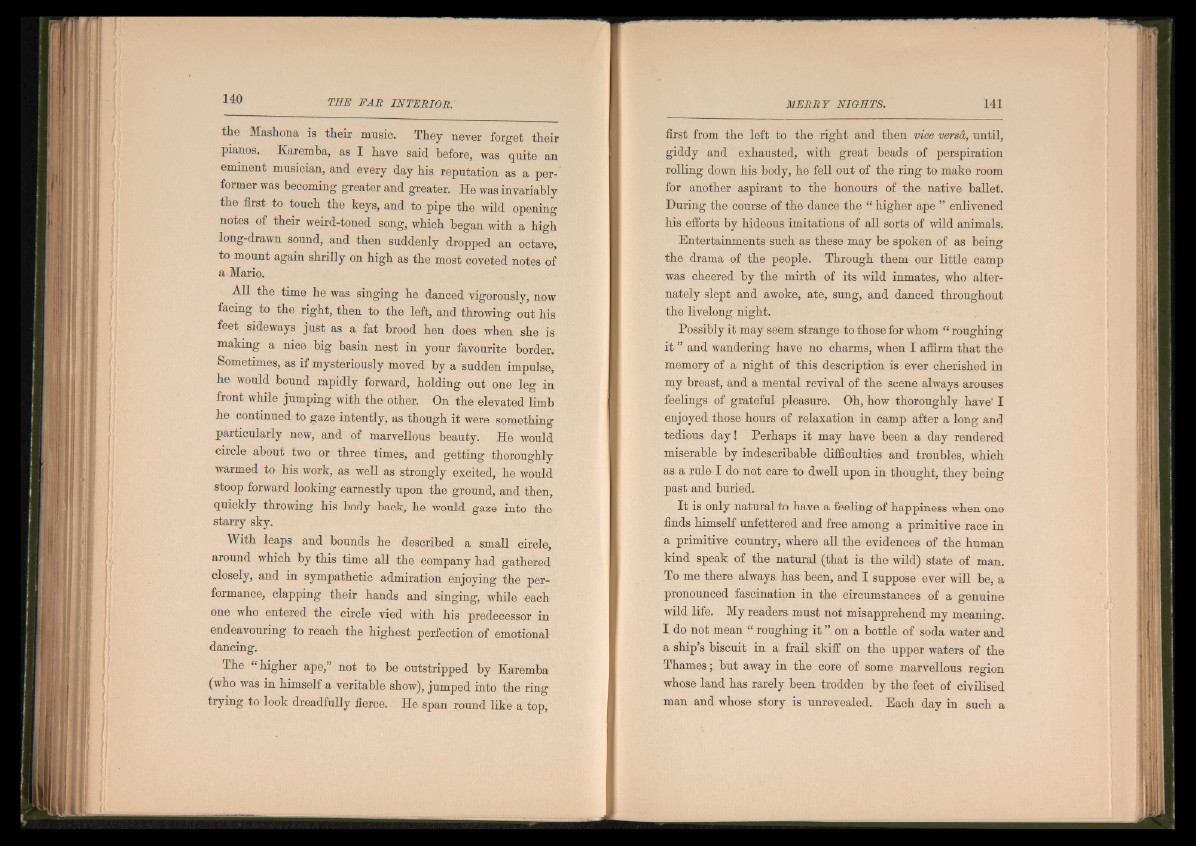
the Mashona is their music. They never forget their
pianos. Karemba, as I have said before, was quite an
eminent musician, and every day his reputation as a performer
was becoming greater and greater. He was invariably
the first to touch the keys, and to pipe the wild opening
notes of their weird-toned song, which began with a high
long-drawn sound, and then suddenly dropped an octave,
to mount again shrilly on high as the most coveted notes of
a Mario.
All the time he was singing he danced vigorously, now
facing to the right, then to the left, and throwing out his
feet sideways just as a fat brood hen does when she is
making a nice big basin nest in your favourite border.
Sometimes, as if mysteriously moved by a sudden impulse,
he would bound rapidly forward, holding out one leg in
front while jumping with the other. On the elevated limb
he continued to gaze intently, as though it were something
particularly new, and of marvellous beauty. He would
circle about two or three times, and getting thoroughly
warmed to his work, as well as strongly excited, he would
stoop forward looking earnestly upon the ground, and then,
quickly throwing his body back, he would gaze into the
starry sky.
With leaps and bounds he described a small circle,
around which by this time all the company had gathered
closely, and in sympathetic admiration enjoying the performance,
clapping their hands and singing, while each
one who entered the circle vied with his predecessor in
endeavouring to reach the highest perfection of emotional
dancing.
The “ higher ape,” not to be outstripped by Karemba
(who was in himself a veritable show), jumped into the ring
trying to look dreadfully fierce. He span round like a top,
first from the left to the right and then vice versa, until,
giddy and exhausted, with great beads of perspiration
rolling down his body, he fell out of the ring to make room
for another aspirant to the honours of the native ballet.
During the course of the dance the “ higher ape ” enlivened
his efforts by hideous imitations of all sorts of wild animals.
Entertainments such as these may be spoken of as being
the drama of the people. Through them our little camp
was cheered by the mirth of its wild inmates, who alternately
slept and awoke, ate, sung, and danced throughout
the livelong night.
Possibly it may seem strange to those for whom “ roughing
it ” and wandering have no charms, when I affirm that the
memory of a night of this description is ever cherished in
my breast, and a mental revival of the scene always arouses
feelings of grateful pleasure. Oh, how thoroughly have11
enjoyed those hours of relaxation in camp after a long and
tedious day ! Perhaps it may have been a day rendered
miserable by indescribable difficulties and troubles, which
as a rule I do not care to dwell upon in thought, they being
past and buried.
I t is only natural to have a feeling of happiness when one
finds himself unfettered and free among a primitive race in
a primitive country, where all the evidences of the human
kind speak of the natural (that is the wild) state of man.
To me there always has been, and I suppose ever will be, a
pronounced fascination in the circumstances of a genuine
wild life. My readers must not misapprehend my meaning.
I do not mean “ roughing it ” on a bottle of soda water and
a ship’s biscuit in a frail skiff on the upper waters of the
Thames ; but away in the core of some marvellous region
whose land has rarely been trodden by the feet of civilised
man and whose story is unrevealed. Each day in such a